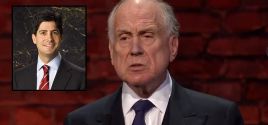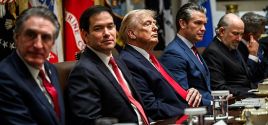Marc Faber Says Cash, Bonds Will Be 'Very Dangerous'By Saeromi Shin, June 09, 2010, 4:46 AM EDTBloomberg Jun. 13, 2010 |
Popular 
Carrie Boller Kicked Off Religious Liberty Commission After Defending Christians' Religious Liberties

Carrie Prejean Boller Takes on the Zionist Lobby at White House Religious Liberty Commission

Trump Expected to Pick Kevin Warsh, Son-in-Law of Zionist Billionaire Ron Lauder, as Fed Chair

Trump Appears Poised to Abandon 'Mass Deportations'

Video Appears to Show Alex Pretti Spit at ICE, Kick Taillight Out of ICE Vehicle in Prior Confrontation
 June 9 (Bloomberg) -- Investor Marc Faber said cash and bonds will be “very dangerous” in the next 10 years as governments increase money supply to cover fiscal deficits. “There’s no other way out but to print money,” Faber, the publisher of the Gloom, Boom & Doom report, said at a forum in Seoul today. “In the long run, all paper money will go exactly to its intrinsic value, which is zero.” Faber advised investors to protect themselves with assets such gold and silver. Bullion climbed to a record in euros, pounds and Swiss francs yesterday as investors sought to preserve their wealth against declining currencies. Risks to the global economic outlook have “risen significantly” and room for policymakers to support growth has become “much more limited and has, in some cases, been exhausted,” International Monetary Fund Deputy Managing Director Naoyuki Shinohara said in Singapore today. Total assets held by U.S. Federal Reserve banks rose to a record $2.35 trillion on May 19 as central bankers printed money to buy debt and rescue lenders as credit markets froze during the global financial crisis. The European Union last month pledged a 750 billion-euro ($900 billion) aid package to prevent a debt spiral that could spread from Greece to Spain and Italy. Bill Gross, who runs the world’s biggest mutual fund at Pacific Investment Management Co., says the best is over for bonds. Record budget deficits and sales of government debt will eventually spur inflation, drawing the almost three-decade bond market rally to a close, the Newport Beach, California-based firm’s co-chief investment officer, said in a March interview. ‘Least Dirty’ Earlier this month, he said the U.S. is emerging as “the least dirty shirt” because it is drawing investors who are seeking safety during the European debt crisis. Spot gold has climbed 12 percent this year and silver has advanced 7 percent. At the same time, the euro has slumped 16 percent as the fiscal crisis made money managers wary that some debt-swamped nations might default, or even revert to old currencies. The MSCI World Index of stocks has slid 10 percent. “If not gold and silver, you will be better off with equities,” Faber said, adding that stocks are unlikely to revisit the lows set in March 2009. “They may not go up a lot, but they will adjust to money printers at central banks.” Faber advised investors to buy U.S. stocks on March 9, 2009, when the S&P 500 reached its lowest level since 1996. The measure subsequently rallied as much as 70 percent. He also predicted in May 2005 that stocks would make little headway that year, with the S&P 500 gaining 3 percent. Faber was less prescient in March 2007, when he said the S&P 500 was more likely to fall than rise because the threats of faster inflation and slower growth persisted. The S&P 500 climbed 10 percent between then and its record of 1,565.15 seven months later. --With assistance from Wes Goodman and David Yong in Singapore. Editor: Reinie Booysen, Linus Chua To contact the reporter on this story: Saeromi Shin in Seoul at [email protected] To contact the editor responsible for this story: Linus Chua in at [email protected] |



